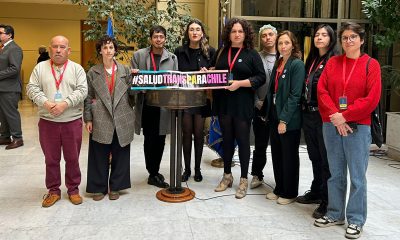South America
Far-right takes control of Chile’s constitutional council
Activists fear LGBTQ, intersex rights could be at risk
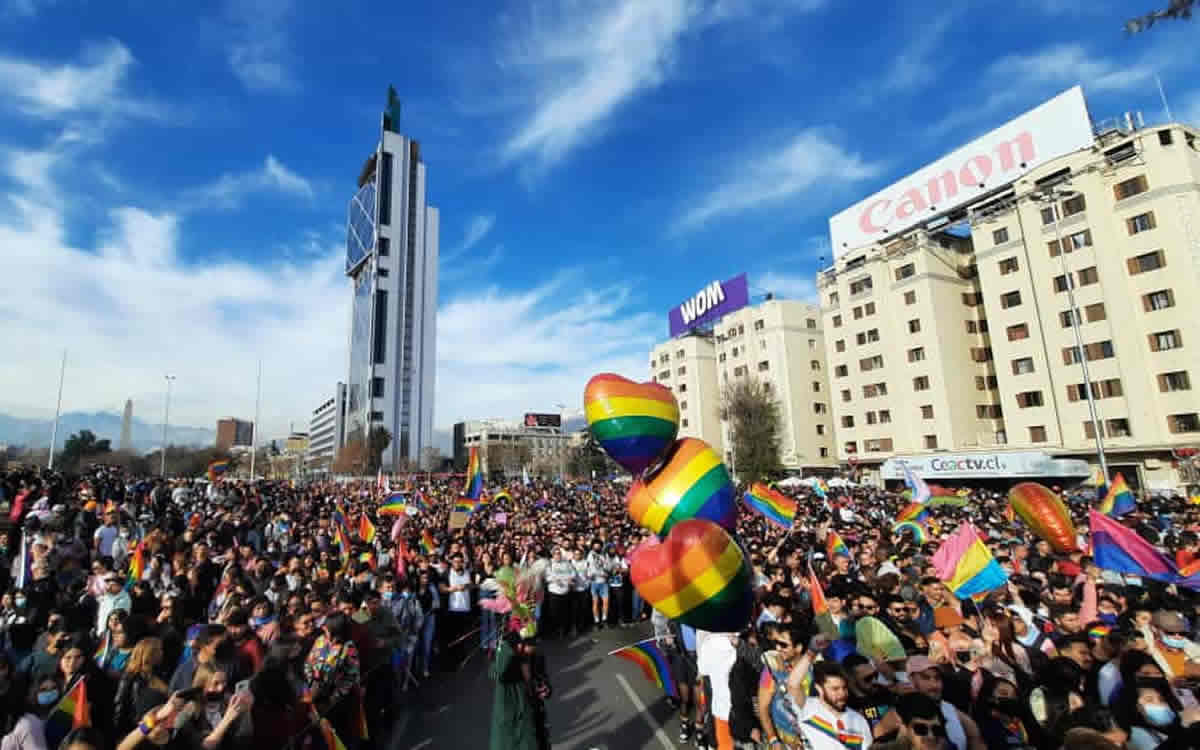
In a twist that raises concerns about LGBTQ and intersex rights in Chile, the body charged with writing the country’s new constitution is now under the control of a far-right political coalition that former presidential candidate José Antonio Kast leads.
Compared to the progressive approach that had characterized the previous Constitutional Convention, the change in the composition and the Republican Party’s control of the constitutional council raises serious concerns.
The former council demonstrated a willingness to address equality and nondiscrimination, including the rights of LGBTQ and intersex people. With the Republican Party in control, however, there have been warnings of potential pushback on hate speech and constitutional protections for queer people.
“The current constitutional process is the last effort to replace the current constitution, which, with all the modifications it has undergone, is still the one built during the dictatorship and reformed with the rules established by the dictatorship,” Gaspar Domínguez, an openly gay man who was the vice president of the previous Constitutional Convention, told the Washington Blade.
Chile’s LGBTQ and intersex community for years has been fighting for recognition and equal right, and it is increasingly fearful the Republican Party could thwart these efforts. Marriage equality, nondiscrimination and recognition of gender identity could be at risk.
Chileans in December will have to return to the polls to approve or reject the constitutional council’s proposal. If rejected, the current constitution that dates back to Gen. Augusto Pinochet’s dictatorship and caused widespread social upheaval in 2019 will remain in force.
Domínguez explained “the text that will be submitted to plebiscite at the end of the year will be the result of the deliberation and voting on the amendments of the constitutional council, which is composed mostly by conservative sectors of the Chilean society that opposed the decriminalization of sodomy in 1999, opposed the divorce law in 2004, that have opposed same-sex marriage bills over the last two decades and that have been linked to the most conservative sectors of the right, to the Catholic and Evangelical churches.”
“Considering this political scenario, it is a real option that the proposal to be voted on at the end of the year constitutes a threat to the civilizational advances that have allowed the LGBTIQ+ community to grow in equality,” he noted.
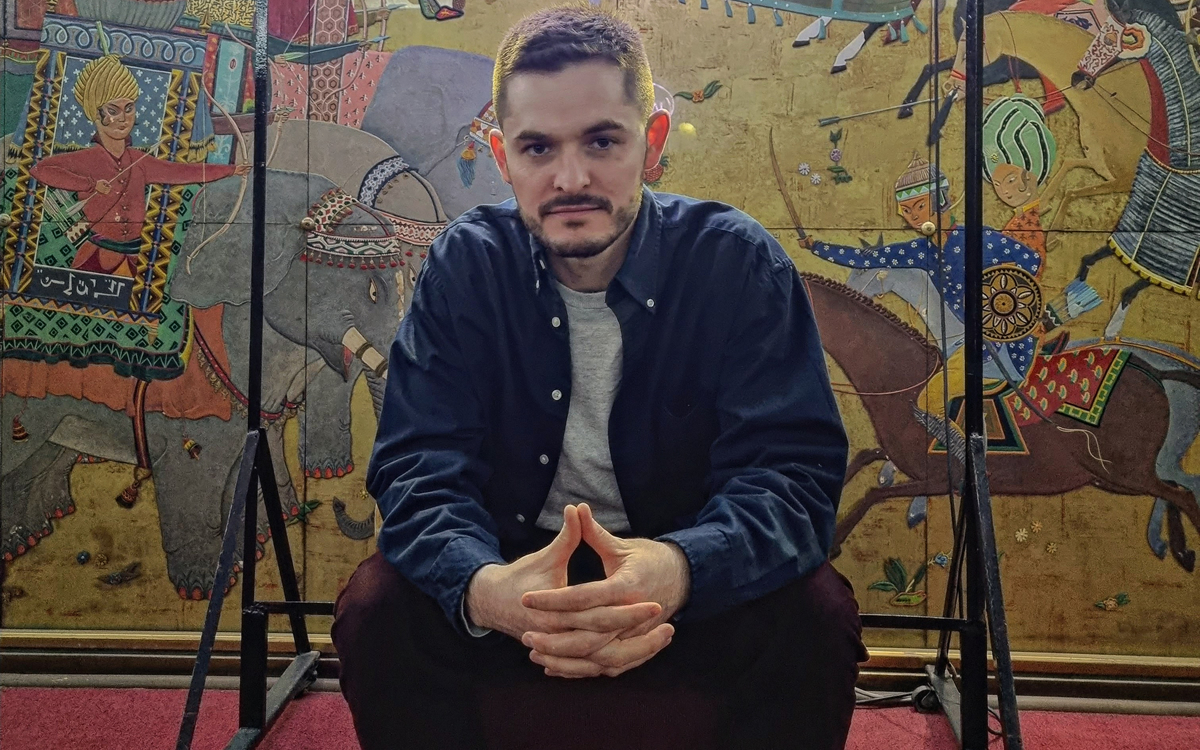
María Pardo, a constitutional lawyer with “Unity for Chile,” the pro-government bloc within the council that champions queer issues, told the Blade “we are in a political context that has led us to write a shorter constitution and with a much more conservative and majority opposition than the previous period that wants to go backwards or not to advance on these issues for different reasons that they use. They consider, for example, that historically oppressed groups enjoy privileges. Faced with sectors (that have) a clear anti-women and anti-sexual diversity agenda, we have to confront them.”
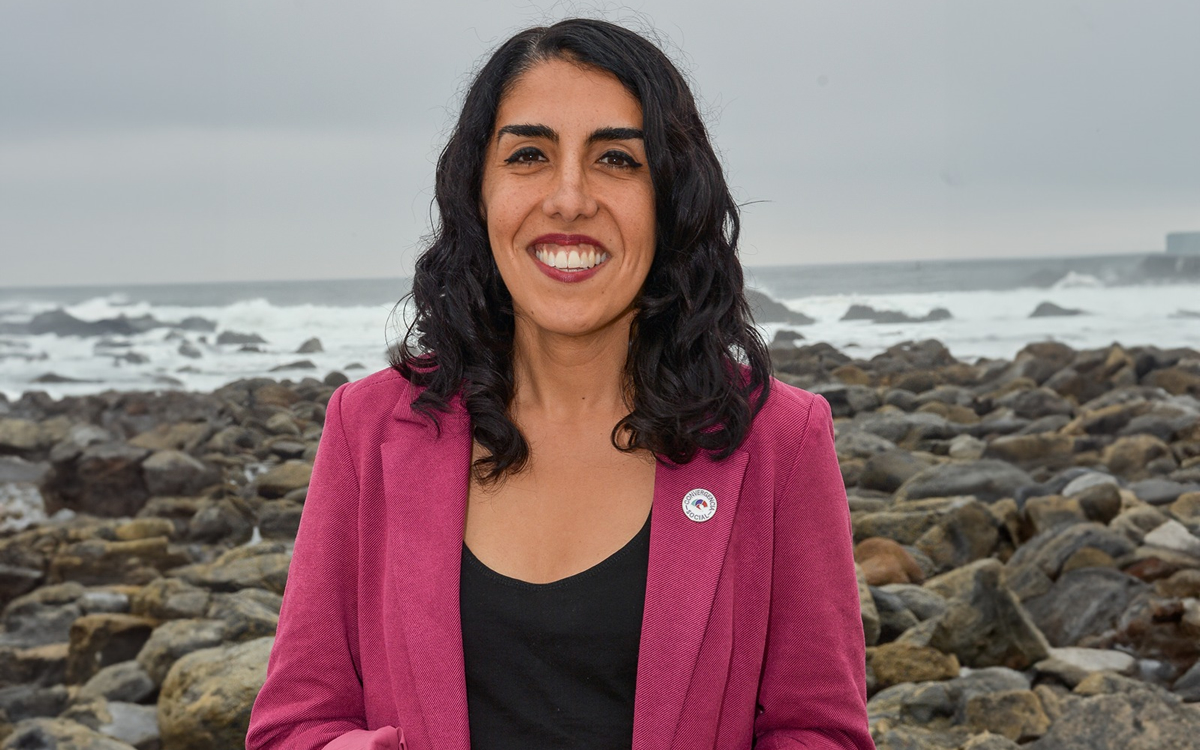
Pardo’s coalition did not present amendments with explicit references to LGBTQ and intersex people because “we did not present aspects as specific as in the convention, but we did present aspects tending to nondiscrimination and recognition of historically vulnerable groups. In this sense, we consider fundamental the development of the so feared, by the right wing, Comprehensive Sexual Education (ESI), as the basis for children and adolescents to feel integrated in safe spaces of development and conversation, leaving out discriminatory stereotypes. In this sense, we insist that comprehensive sexual education is a human right and not a sole and exclusive responsibility of families.”
Gloria Hutt, a constitutional advisor for Evópoli, a center-right political party that supports LGBTQ and intersex rights, indicated the nondiscrimination amendment is not at risk.
“My impression is that it should indeed be approved in the plenary, because it is an obvious right the protection of people’s rights and an element of nondiscrimination,” she told the Blade. “At least, I don’t have the impression that it is at risk.”
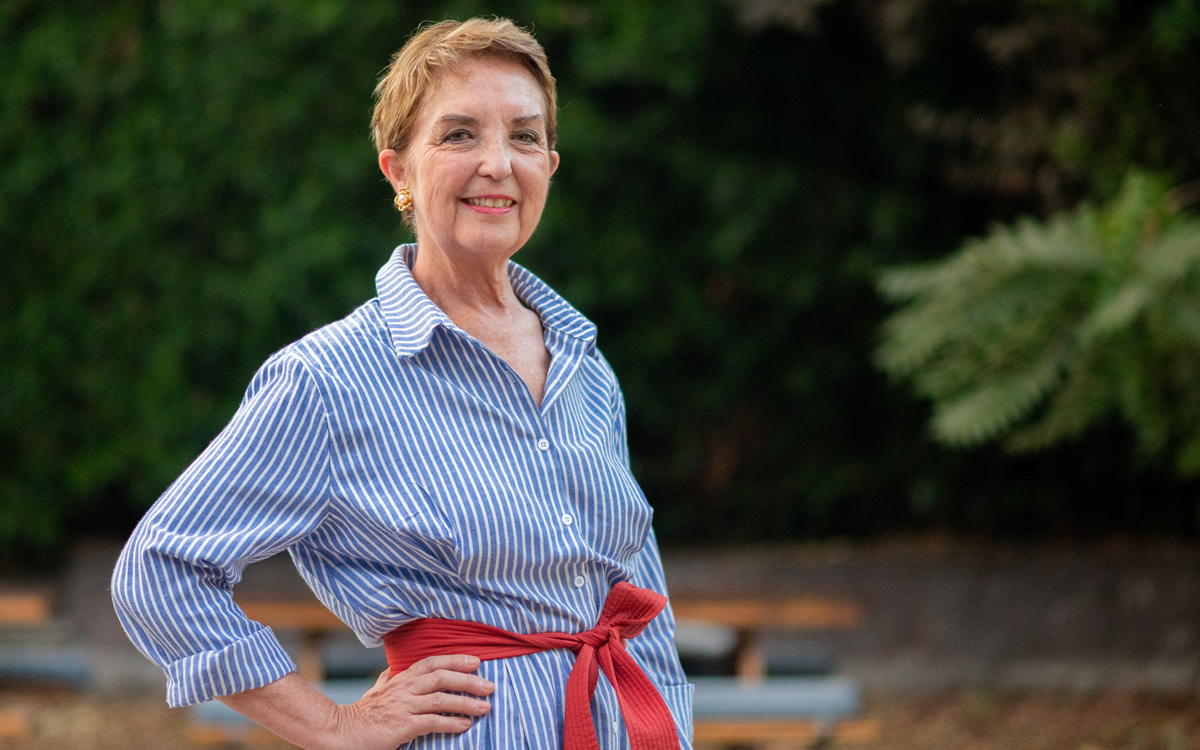
Hutt, who was a former minister in President Sebastián Piñera’s government, argues the “lack of mention of specific groups” in the draft constitution “has to do mainly with the fact that the identification of elements of inclusion or nondiscrimination are very many. So, in the constitution, what is left is the general principle and not the specific mention of each one of the groups. That is why nondiscrimination is maintained as a principle, but without specifying the type of discrimination, but of course, sexual orientation.”
Fundación Iguales, a Chilean LGBTQ and intersex rights organization, said they are closely watching the debate over the new constitution and how it will impact queer people.
“We are monitoring the work with concern,” Mauricio Henríquez, the group’s legal director, told the Blade. “Extreme conservative discourses could directly harm the rights of LGBTI+ people.”
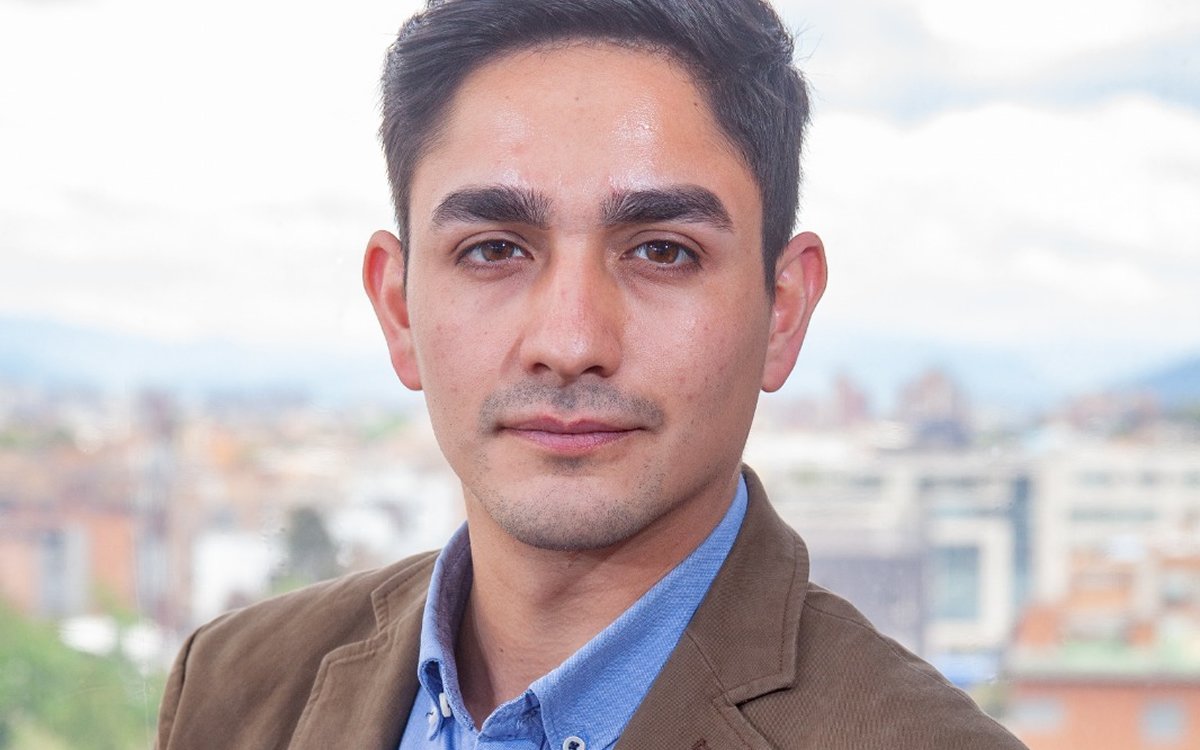
Henríquez added “historically, the conservative ultra-right has opposed the recognition and protection of the rights of sexual and gender diversity. They were against the Civil Union Agreement, equal marriage, the regulation of gender Identity, etc. So, given this background and the harsh comments expressed by some councilors regarding rights and freedoms in the last weeks, it would not be surprising that the constituent drafting would take the same course as the aforementioned rights.”
Henríquez finally pointed out that “more than a setback, there is a kind of invisibilization of historically discriminated groups, including LGBTI+ people.”
“Here it is important to make clear that the state of Chile and the inhabitants of this country already have a commitment to sexual and gender diversity that no political sector, no matter how conservative or extremist it may be, can deny,” he said. “For this reason, the call we make from Fundación Iguales is that the constitutional advisors legislate looking at the reality of a country that day by day advances in freedom, development and protection of human rights.”
Colombia
Colombia avanza hacia la igualdad para personas trans
Fue aprobado en Comisión Primera de la Cámara la Ley Integral Trans

En un hecho histórico para los derechos humanos en Colombia, la Comisión Primera de la Cámara de Representantes aprobó en primer debate el Proyecto de Ley 122 de 2024, conocido como la Ley Integral Trans, que busca garantizar la igualdad efectiva de las personas con identidades de género diversas en el país. Esta iniciativa, impulsada por más de cien organizaciones sociales defensoras de los derechos LGBTQ, congresistas de la comisión por la Diversidad y personas trans, representa un paso decisivo hacia el reconocimiento pleno de derechos para esta población históricamente marginada.
La Ley Integral Trans propone un marco normativo robusto para enfrentar la discriminación y promover la inclusión. Entre sus principales ejes se destacan el acceso a servicios de salud con enfoque diferencial, el reconocimiento de la identidad de género en todos los ámbitos de la vida, la creación de programas de empleo y educación para personas trans, así como medidas para garantizar el acceso a la justicia y la protección frente a violencias basadas en prejuicios.
Detractores hablan de ‘imposición ideológica
Sin embargo, el avance del proyecto no ha estado exento de polémicas. Algunos sectores conservadores han señalado que la iniciativa representa una “imposición ideológica”. La senadora y precandidata presidencial María Fernanda Cabal anunció públicamente que se opondrá al proyecto de Ley Integral Trans cuando llegue al Senado, argumentando que “todas las personas deben ser tratadas por igual” y que esta propuesta vulneraría un principio constitucional. Estas declaraciones anticipan un debate intenso en las próximas etapas legislativas.
El proyecto también establecelineamientos claros para que las instituciones públicas respeten el nombre y el género con los que las personas trans se identifican, en concordancia con su identidad de género, y contempla procesos de formación y sensibilización en entidades estatales. Además, impulsa políticas públicas en contextos clave como el trabajo, la educación, la cultura y el deporte, promoviendo una vida libre de discriminación y con garantías plenas de participación.
¿Qué sigue para que sea ley?
La Ley aún debe superar varios debates legislativos, incluyendo la plenaria en la Cámara y luego el paso al Senado; pero la sola aprobación en Comisión Primera ya constituye un hito en la lucha por la igualdad y la dignidad de las personas trans en Colombia. En un país donde esta población enfrenta altos niveles de exclusión, violencia y barreras estructurales, este avance legislativo renueva la esperanza de una transformación real.
Desde www.orgullolgbt.co, celebramos este logro, invitamos a unirnos en esta causa impulsándola en los círculos a los que tengamos acceso y reiteramos nuestro compromiso con la visibilidad, los derechos y la vida digna de las personas trans. La #LeyIntegralTrans bautizada “Ley Sara Millerey” en honor de la mujer trans recientemente asesinada en Bello, Antioquia (ver más aquí); no es solo una propuesta normativa: es un acto de justicia que busca asegurar condiciones reales para que todas las personas puedan vivir con libertad, seguridad y respeto por su identidad.
Colombia
Claudia López running for president of Colombia
Former Bogotá mayor married to Sen. Angélica Lozano
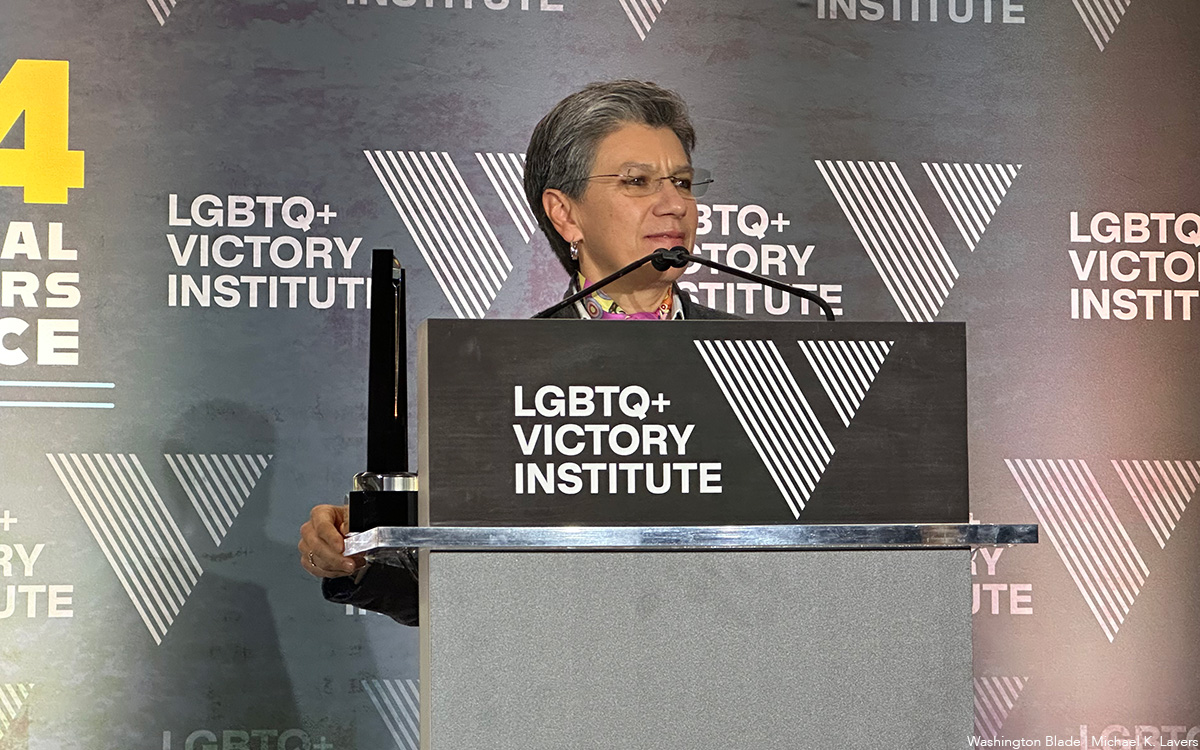
Former Bogotá Mayor Claudia López has announced she is running for president of Colombia.
“We begin today and we will win in a year,” she said in a social media post on June 3.
View this post on Instagram
López, 55, was a student protest movement leader, journalist, and political scientist before she entered politics. López returned to Colombia in 2013 after she earned her PhD in political science at Columbia University.
López in a speech she gave last December after the LGBTQ+ Victory Institute honored her at its annual International LGBTQ Leaders Conference in D.C. noted Juan Francisco “Kiko” Gomez, a former governor of La Guajíra, a department in northern Colombia, threatened to assassinate her because she wrote about his ties to criminal gangs.
A Bogotá judge in 2017 convicted Gómez of ordering members of a paramilitary group to kill former Barrancas Mayor Yandra Brito, her husband, and bodyguard and sentenced him to 55 years in prison.
López in 2014 returned to Colombia, and ran for the country’s Senate as a member of the center-left Green Alliance party after she recovered from breast cancer. López won after a 10-week campaign that cost $80,000.
López in 2018 was her party’s candidate to succeed then-President Juan Manuel Santos when he left office. López in 2019 became the first woman and first lesbian elected mayor of Bogotá, the Colombian capital and the country’s largest city.
López took office on Jan. 1, 2020, less than a month after she married her wife, Colombian Sen. Angélica Lozano. (López was not out when she was elected to the Senate.) López’s mayorship ended on Dec. 31, 2023. She was a 2024 Harvard University Advance Leadership Initiative fellow.
The first-round of Colombia’s presidential election will take place on May 31, 2026.
The country’s 1991 constitution prevents current President Gustavo Petro from seeking re-election.
López declared her candidacy four days before a gunman shot Sen. Miguel Uribe, a member of the opposition Democratic Center party who is seen as a probable presidential candidate, in the head during a rally in Bogotá’s Fontibón neighborhood.
She quickly condemned the shooting. López during an interview with the Washington Blade after the Victory Institute honored her called for an end to polarization in Colombia.
“We need to listen to each other again, we need to have a coffee with each other again, we need to touch each other’s skin,” she said.
López would be Colombia’s first female president if she wins. López would also become the third openly lesbian woman elected head of government — Jóhanna Sigurðardóttir was Iceland’s prime minister from 2009-2013 and Ana Brnabić was Serbia’s prime minister from 2017-2024.
Chile
Gay pharmacist’s murder sparks outrage in Chile
Francisco Albornoz’s body found in remote ravine on June 4

The latest revelations about the tragic death of Francisco Albornoz, a 21-year-old gay pharmacist whose body was found on June 4 in a remote ravine in the O’Higgins region 12 days after he disappeared, has left Chile’s LGBTQ community shocked.
The crime, which was initially surrounded by uncertainty and contradictory theories, has taken a darker and more shocking turn after prosecutors charged Christian González, an Ecuadorian doctor, and José Miguel Baeza, a Chilean chef, in connection with Albornoz’s murder. González and Baeza are in custody while authorities continue to investigate the case.
The Chilean Public Prosecutor’s Office has pointed to a premeditated “criminal plan” to murder Albornoz.
Rossana Folli, the prosecutor who is in charge of the case, says Albornoz died as a a result of traumatic encephalopathy after receiving multiple blows to the head inside an apartment in Ñuñoa, which is just outside of Santiago, the Chilean capital, early on May 24. The Prosecutor’s Office has categorically ruled out that Albornoz died of a drug overdose, as initial reports suggested.
“The fact that motivates and leads to the unfortunate death of Francisco is part of a criminal plan of the two defendants, aimed at ensuring his death and guaranteeing total impunity,” Folli told the court. “The seriousness of the facts led the judge to decree preventive detention for both defendants on the grounds that their freedom represents a danger to public safety.”
Prosecutors during a June 7 hearing that lasted almost eight hours presented conservations from the suspects’ cell phones that they say showed they planned the murder in advance.
“Here we already have one (for Albornoz.) If you bring chloroform, drugs, marijuana, etc.,” read one of the messages.
Security cameras captured the three men entering the apartment where the murder took place together.
Hours later, one of the suspects left with a suitcase and a shopping cart to transport Albornoz’s body, which had been wrapped in a sleeping bag. The route they followed to dispose of the body included a stop to buy drinks, potato chips, gloves, and a rope with which they finally descended a ravine to hide it.
Advocacy groups demand authorities investigate murder as hate crime
Although the Public Prosecutor’s Office has not yet officially classified the murder as a hate crime, LGBTQ organizations are already demanding authorities investigate this angle. Human rights groups have raised concerns over patterns of violence that affect queer people in Chile.
The Zamudio Law and other anti-discrimination laws exist. Activists, however, maintain crimes motivated by a person’s sexual orientation or gender identity are not properly prosecuted.
“This is not just a homicide, it is the cruelest expression of a society that still allows the dehumanization of LGBTQ+ people,” said a statement from Fundación Iguales, one of Chile’s main LGBTQ organizations. “We demand truth, justice, and guarantees of non-repetition.”
The Movement for Homosexual Integration and Liberation (Movilh), meanwhile, indicated that “since the first day the family contacted us, we have been in conversations with the Prosecutor’s Office so that this fatal outcome is thoroughly investigated, including the possible existence of homophobic motivations or components.”
The investigation into Albornoz’s murder continues, and the court has imposed a 90-day deadline for authorities to complete it.
-

 U.S. Supreme Court4 days ago
U.S. Supreme Court4 days agoSupreme Court upholds ACA rule that makes PrEP, other preventative care free
-

 U.S. Supreme Court4 days ago
U.S. Supreme Court4 days agoSupreme Court rules parents must have option to opt children out of LGBTQ-specific lessons
-

 District of Columbia5 days ago
District of Columbia5 days agoMan sentenced to 15 years in prison for drug deal that killed two DC gay men
-

 Federal Government5 days ago
Federal Government5 days agoWhite House finds Calif. violated Title IX by allowing trans athletes in school sports





